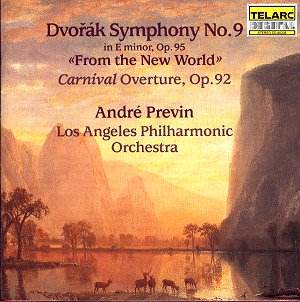The coupling of Dvořák’s
most popular symphony with his best-known short orchestral work sounds
like a good idea, and there is much to praise and enjoy in this issue.
Carnival receives a bright,
lively performance, also admirably tidy in the tricky figuration Dvořák
gives to many parts of the orchestra – e.g. horns, then violins around
3:09 (track 1). The interlude that follows, with its four-note ostinato
started by the cor anglais, is played most beautifully, too. Indeed, the
only real drawback is the balance at the very start of the overture, where
the main theme is almost drowned by noisy percussion. The recording quality
is generally very acceptable, but does suffer from a certain lack of depth
and perspective that you often find in American recordings.
Previn begins the New World in a thoughtful,
restrained way that is very effective. The quirks of recording balance
are soon with us again though, in the alarmingly close and loud timpani
strokes at 0:54 (track 2). The main Allegro that follows is lacking
in thrust and momentum; the tempo sags here and there, so that the final
impression is of a movement that never quite catches fire. There are
some irritating mannerisms in Previn’s phrasing, too, that hold the
music up, e.g. the unrhythmical drawing out of the notes at the ends
of the strings’ phrases, track 2, 2:11.
The Largo is beautifully done, with a fine contribution
from the Los Angeles cor anglais player, and here Previn preserves the
forward pulse without ever hurrying the music. I do object to clumsy
editing though; when the woodwind reprise the opening brass chords at
2:17 (track 3), the beginning of one of the chords has been ‘chopped’,
presumably because the attack lacked unanimity. But I for one would
rather have an untidy chord than the awful artificial sound we have
here; why not go the whole hog and play the symphony on a synthesiser?
There are examples of this nefarious practice elsewhere on the disc.
The Scherzo is as delicious as ever, and I loved
Previn’s brisk, business-like tempo. Another balance problem surfaces
at the beginning of the trio, (track 4, 3:12) where the accompanying
strings are far too loud for the woodwind who present the melody. The
Allegro con fuoco finale is convincing enough, with some powerful
playing from the fine Los Angeles strings. But what on earth is Previn
doing in the passage of triplets that follows on from the main theme,
at 1:16? The music gallops off in the most bizarre way, and I think
we hear the sound of an orchestra being dragged along by their corporate
scruffs! Not pretty. The final chord of the symphony, never a comfortable
one for the wind, is here top heavy and a little out of tune, though
I’ve heard worse.
For me, the main disadvantage in this recording lies
in the sound of the orchestra. The LAPO is a fine ensemble, but
its chief (and remarkable) quality is its smoothness, and
I found myself continually yearning for brass with more genuine edge
and bite, woodwind with more reediness, a touch of the outdoor quality
you must have in Dvořák’s music. This is a high quality
performance in its way, despite the quirks mentioned above; but it can’t
really compare with combinations like Kubelik and the Bavarian RSO,
or, my perennial favourite, Kertész and the LSO.
A disappointing issue, then, from such a great musician
as André Previn, despite much fine playing and the undoubtedly
attractive coupling.
Gwyn Parry-Jones


